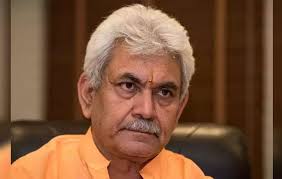NC’s Surinder Choudhary accuses L-G Manoj Sinha of ‘running proxy govt’

Growing Rift in J&K’s Power Structure
Deputy Chief Minister Surinder Choudhary has accused Lieutenant Governor Manoj Sinha of undermining Jammu & Kashmir’s elected government. According to Choudhary, the LG’s office is making major administrative decisions without involving elected leaders. He described this as a “proxy government” and said it violates democratic principles.
Choudhary made the statement on June 12 during a press conference in Srinagar. He criticized recent bureaucratic transfers, saying they were approved without consulting the NC-led government.
“We Won’t Stay Silent”
“We received a clear mandate from the people,” Choudhary said. “But if unelected officials act without our approval, then where is democracy?”
He warned of street protests if the situation continues. “This is not a banana republic. We will not stay silent,” he added.
Choudhary also stated that his government is ready to resist any attempt to sideline its authority.
Statehood Demand Gains Momentum
The conflict has revived the debate over restoring Jammu & Kashmir’s statehood. In 2019, the central government revoked Article 370 and turned the state into a Union Territory. Since then, power has remained divided between the Raj Bhavan and elected officials.
Choudhary repeated his party’s core demand: immediate restoration of full statehood. “Statehood isn’t a favor. It’s a right,” he said.
He believes that without statehood, elected governments can’t function effectively. “Bureaucrats ignore us. They answer only to the LG. This must change,” Choudhary emphasized.
LG Sinha Maintains Silence
Manoj Sinha has not responded publicly to these allegations. However, Raj Bhavan insiders say the LG acts within the constitutional framework. They claim the LG’s decisions follow proper procedures.
Still, critics argue that legality isn’t the only concern. “Democracy isn’t just about rules. It’s about respecting the people’s voice,” said political analyst Faheem Qadri.
He pointed out that citizens vote to choose their leaders, not to empower unelected officials.
Other Parties React
The Congress and PDP supported the NC’s position. They accused the central government of weakening democratic institutions in the region.
Former Chief Minister Omar Abdullah also reacted on social media. He posted,
“When elected leaders feel powerless in their own government, it’s time to reflect.”
Civil society groups echoed similar concerns. Many fear that this parallel structure of power may lead to long-term instability.
What Happens Next?
The National Conference is considering legal and political options. Party leaders may challenge the LG’s authority in court if no change occurs. They are also planning a public awareness campaign to highlight the issue.
This campaign will include rallies, press events, and outreach to grassroots supporters. The goal is to demand immediate restoration of statehood and ensure elected leaders control governance.
A Larger Question of Federalism
At the core of this dispute lies a larger question. How should India balance central authority and regional autonomy? While the Constitution allows the Centre to govern Union Territories, the situation in J&K is unique.
J&K has a long political history. It once had a special constitutional status. Many now believe that imposing top-down control erodes trust and damages democracy.
“This is more than a legal issue. It’s about the soul of federalism in India,” said political scientist Zoya Parvez.
Conclusion: Restore Trust, Restore Power
Surinder Choudhary’s statements have reignited a key debate in Indian politics. His party demands not just respect, but real power to govern. The people of Jammu & Kashmir expect their elected leaders to make decisions—not to act as bystanders.
For long-term peace and development, New Delhi must respond. Restoring statehood and limiting bureaucratic overreach could rebuild public trust. Until then, the standoff is likely to continue—and democracy in J&K may remain in question.






